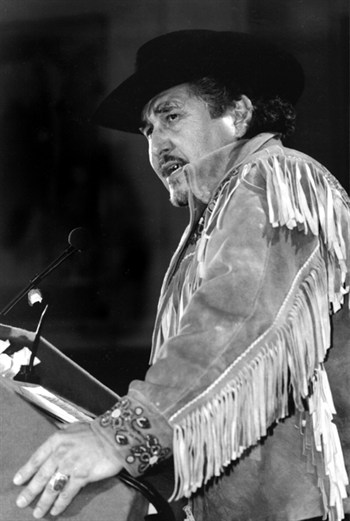“A just society is not just for some of us and not for others; it has to be for everyone.”
~ Harry Daniels
The last few years have seen some landmark moments for Indigenous recognition at the federal government level – changes that have come about thanks to decades-long perseverance and advocacy by tireless champions.
Namely, the Daniels Decision of 2016 and the Political Accord signed in 2018 are both major steps towards meaningful reconciliation between Indigenous Peoples and the Canadian government. In each case, a clearer path forward has been created, allowing us to now make headway on rights, land claims, programs, services and governance denied to so many, for so long.
One of the driving forces behind these victories is the Congress of Aboriginal Peoples (CAP), of which IPAM is an affiliate organization. Our President, Ernie Blais, serves on the CAP Board of Directors and esteemed IPAM members like Elder John Morrisseau have also worked alongside CAP and its leaders for decades, bring awareness and recognition of the issues important to Indigenous People in all regions of Manitoba.
As these decisions happened at the national and federal levels, the outcomes of Daniels Decision and the Political Accord will benefit Indigenous Peoples across Canada, including Manitoba. In particular, there is finally a legal obligation and formal agreement with the federal government to take account of the interests and needs of Métis and non-status Indigenous Peoples.
Indeed, as CAP National Chief Robert Bertrand stated during his welcoming address at the 2018 Daniel’s Symposium, there is now a “paramount need and requirement for reconciliation between the federal government and our off-reserve Indigenous Peoples.”
“The case of Daniels v. Canada is a powerful example of the injustices that have been rendered to our people over successive decades when government, both federal and provincial, has subjected our human rights as a political football to be passed back and forth. Reconciliation starts with inclusion. As inclusion is key to repairing the Government of Canada’s relationship with Indigenous Peoples, government must include the advancement of rights and legislation for our people, regardless or status or residence, in all present and future policy development and implementation.”

Daniel’s Decision – April 14, 2016
The Daniels Decision marks the beginning of a new era for Indigenous Peoples. It is the culmination of a 17-year-long legal battle with the Government of Canada that finally made it clear that the federal government is legally accountable for ‘Métis and non-status Indian interests’. According to CAP, this decision represents the greatest opportunity for change in the history of Métis and non-status Indigenous Peoples.
The Decision is named for Harry Daniels (1940–2004), a Métis from Saskatchewan, former CAP leader, and one of the plaintiffs on the case: the Daniels Decision represents a lifetime of his dedicated work searching for social justice for Métis and non-status Indigenous People of Canada. The Daniels Decision means that for the first time in history, Métis and non-status Indigenous Peoples know who is responsible for the other end of the dialogue on matters of programs and services, rights, land claims and self- governance. It means real change is finally possible.
Specifically, the Daniels case was about obtaining a declaration stating that “Métis and non-status Indians be recognized as Indians under section 91(24) of the Constitution Act, 1982.” Plaintiffs asked the Court to declare that the Queen owes a fiduciary duty to them (where ‘fiduciary’ refers to the duty of one party to take care of and look after the interests of another party) and that they have the right to be consulted by the federal government on a collective basis, as a show of respect for their rights, interests, and needs as Indigenous People.
On April 14, 2016, the Supreme Court of Canada ruled that the federal government has “a Constitutional responsibility for Métis and non-Status Indians,” marking a historic victory for Indigenous peoples in Canada.
What the Daniels Decisions Means
According to CAP, the Daniels Decision DOES:
- Recognize Métis and non-status Indigenous Peoples as ‘Indians’ in the Constitution. This recognition is fundamentally different than registered Indian status.
- Prevent the federal government from turning down proposals on the basis that they are outside of federal jurisdiction.
However, the Daniels Decision DOES NOT:
- Compel the federal government to pass any specific laws or programs for Métis and non-status Indigenous Peoples – but rather it serves as a starting point for those seeking programs and services claims as there is now someone accountable for handling these matters.
- Make Métis and non-status Indigenous Peoples eligible for Indian status. Programs specifically available to those with status are not currently available to Métis and non-status Indigenous Peoples. It does provide policy-based justification for making existing federal programs and services more available to Métis and non-status Indigenous Peoples in the future.
Most importantly, CAP says the Daniels Decision means the end of the persistent game of jurisdictional “hide and seek” perpetuated by the federal and provincial governments.
For example, in many regions of Canada, including Manitoba, Métis and non-status or off-reserve Indigenous Peoples have been caught in the middle of a dispute between the federal and provincial governments over who held legal accountability for their interests. This jurisdictional argument led to neither level of government taking accountability, leading to the needs and interests of our people being ignored and making it impossible to make any headway on rights, land claims, programs and services, and governance, as there was no one to hold a dialogue with.
But the Daniels Decision put a new wheel in motion: now we know who to engage in discussions with and where to direct our strong, collective voice.

Political Accord – December 5, 2018
The Political Accord is an agreement between CAP and the Government of Canada that sets out their jointly agreed objectives, policy priorities, and a process for implementation with resources and funding. The goals of the agreement include building a renewed relationship based on rights, respect, co-operation, and partnership to close the socio-economic gap between Indigenous peoples and non-Indigenous Canadians.
Signed on December 5, 2018, this is a renewed Accord and reflects CAP’s updated relationship with the government in response to the Daniels Decision. Previous Accords between CAP and the federal government were signed in 1994, 1998 and 2005.
What the Political Accord Means
Through the Accord, the federal government has committed to working with CAP, and supporting the participation of its provincial affiliates like IPAM, in matters related to the rights, interests and needs of our constituents.
The renewed Accord also recognizes the federal government’s jurisdiction and fiduciary duty to Métis and non-status Indigenous Peoples as confirmed in the Daniels Decision.
Ultimately, the Accord is a tool for collaborative work that holds the government to account to engage with CAP, their affiliates like IPAM, and their constituencies. For example, CAP will now proceed to work with the government to establish clear timelines and concrete deliverables based on agreed-upon goals in the Accord.
As CAP states on its website: “Through the signing of the Accord, the federal government is acknowledging their responsibility to the off-reserve Métis, status and non-status Indians, and Southern Inuit Indigenous Peoples. The Accord sets out a path toward Daniels implementation as part of joint work-planning process, including co-developing policies and initiatives.”
What’s Next? Keeping the Wheel Moving
As CAP states on its website: “Indigenous Peoples are ready to settle claims, implement rights, unlock human potential, and even prepare for self-governments for Métis and Indian communities outside of the Indian Act structures.”
“There has been severe and lasting damage to Indigenous Peoples who are not recognized or registered as off-reserve Indians. Legislation had divided families and communities according to externally created categories and destabilized social structures necessary for communities to function. These categories prevented Indigenous people from defining who belongs to their communities according to their own traditions and continued the cycle of assimilation.”
By working together, through not-for-profit advocacy organizations like IPAM and CAP, we can now capitalize on the momentum and legal foundation created by the Daniels Decision and the Political Accord to advance the issues of rights, land, governance, and programs in all our communities, for all our people.
What You Can Do
There are many ways you can get involved, share your voice, and advance the issues important to you and your community. You can:
- Watch: A Short Video on Harry Daniels.
- Read: CAP’s booklet on understanding the Daniels Decision and how you can use it to inspire political will and action:
- Join: IPAM and access our resources to come together, youth and adults alike, to deliver one clear, compelling, and influential message to governments in Manitoba and Canada. As CAP says, “In order to turn possibility into real change, we need to come together with a united sense of purpose.”
When we work together, better programs, rights, land claims, self-governance and more all become possible for all Indigenous Peoples.
The Indigenous Peoples Alliance of Manitoba (IPAM) is a collective voice broadly representing, preserving and promoting the heritage, culture, language and rights of all Indigenous Peoples in Manitoba. We work together to inclusively and respectfully represent the interests of all Métis, First Nation, Inuit, and Non-Status or Off-Reserve Peoples who identify as Indigenous in urban, rural and remote areas of the province. IPAM is an official affiliate organization of the Congress of Aboriginal Peoples, one of five National Indigenous Organizations recognized by the Government of Canada.
Source: Congress of Aboriginal Peoples (CAP)
Note: As ‘Indian’ is still a legal term in Canadian Law, this is why it’s sometimes used in our publications and materials.

